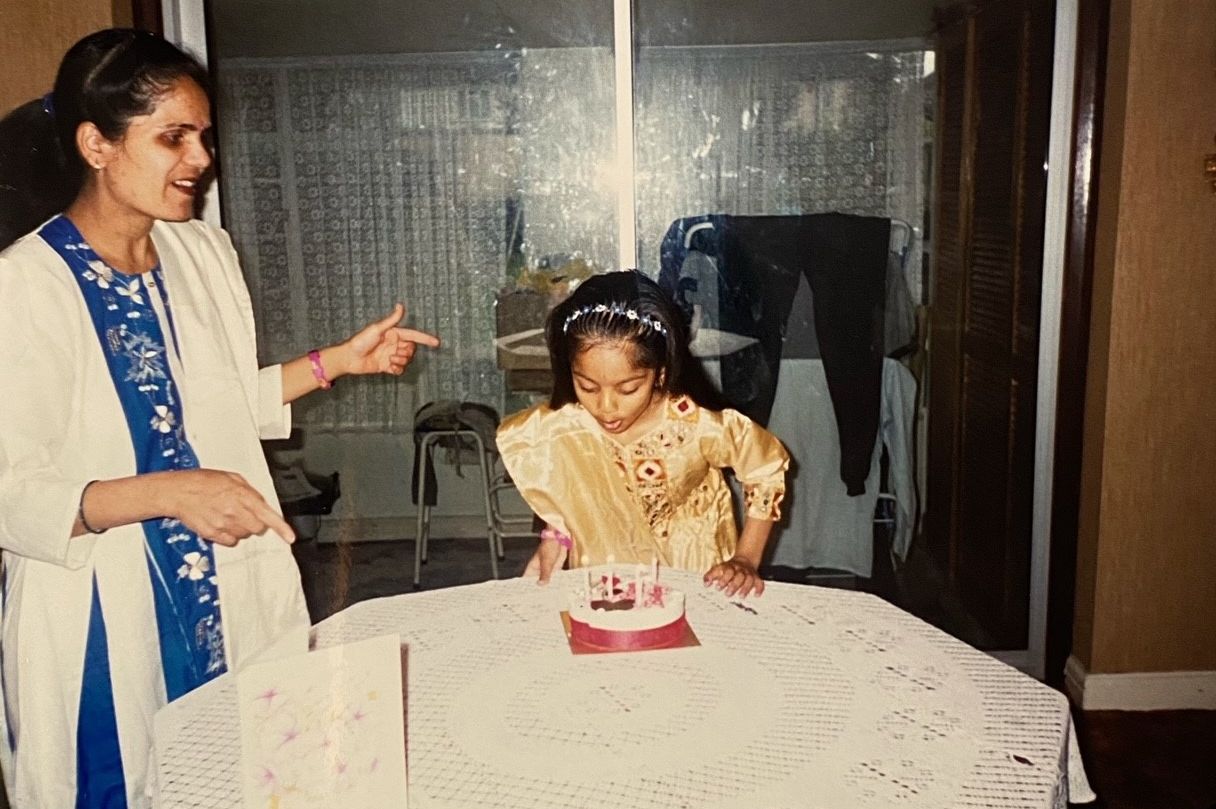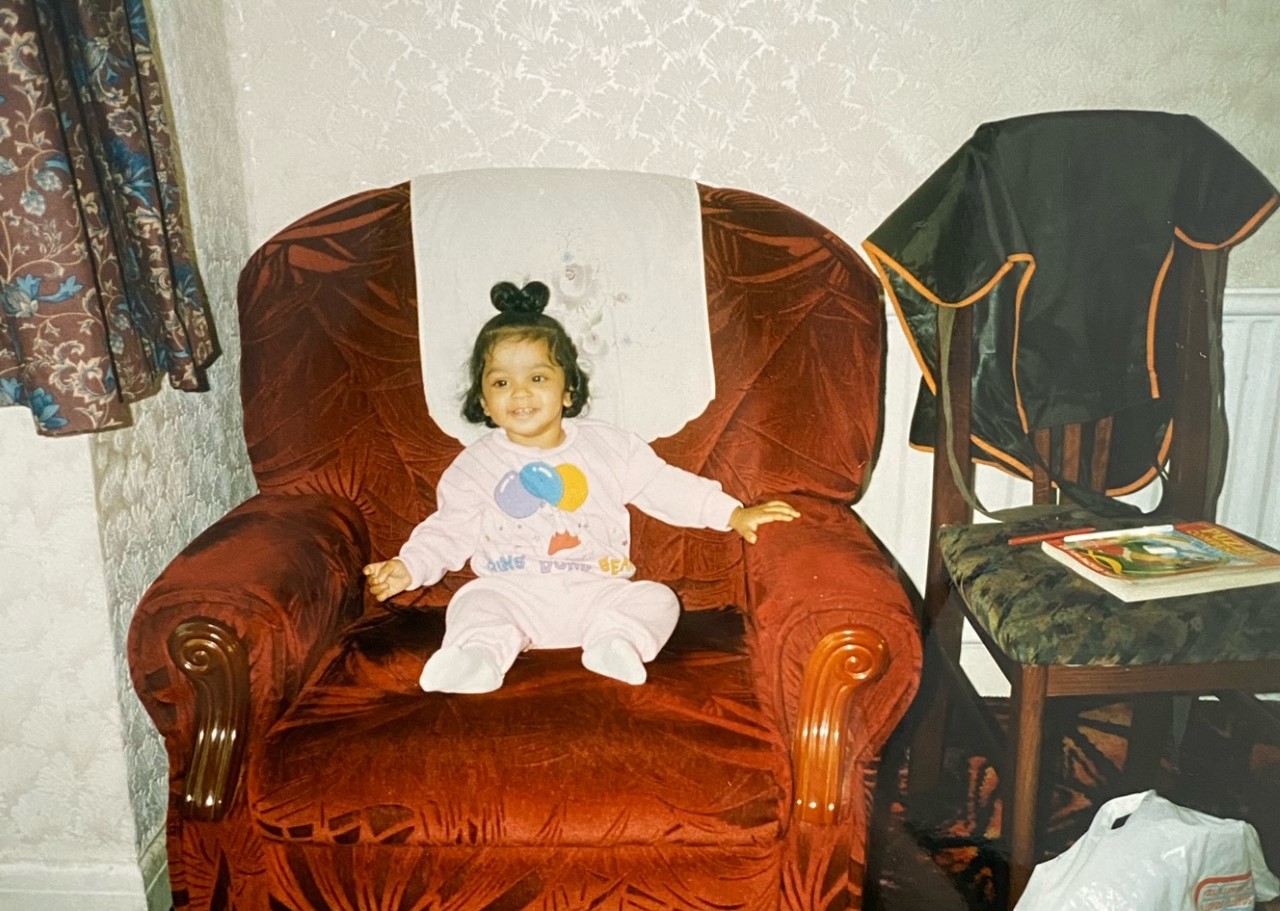Written by Varsha Patel
Writer Varsha Patel details her relationship with the ritual.
I’m 10 years old and it’s late on a Sunday afternoon. I’ve just finished haphazardly drying my hair with a dryer that’s almost certainly on its last legs. The smoky, singed smell coming out of it signals the rude reality of living in a house with four women who all have the same hair-wash day as you.
The second I flick the hairdryer off, my mum appears at the bottom of the stairs, shouting for me to bring down the coconut oil. It’s time for my weekly scalp massage. Some mums pass down vintage outfits for their daughters to repurpose later in life and, while I do have my fair share of unusually chic items, the greatest tradition she passed on to me consists of a small bottle of KTC Coconut Oil and a quiet moment on a Sunday. It’s been our routine for as long as I can remember.

It always went a little bit like this: post-hair washing, drying and detangling, my mum would scoop up a generous amount of coconut oil, rub it between her palms and proceed to attack my scalp. I say ‘attack’ because her force was really quite something. Massaging the oil with her fingers and the palm of her hands, she applied pressure to the centre point of my scalp. Though it felt like hours, it was likely only a 10-minute process.
As a child, my hair was staggeringly thick – so much so that combing it felt like a chore. My mum still complains about how much her arms would hurt when she had to wash my hair or tackle the tangles. Yet, despite the trouble, coconut oil was a non-negotiable part of Hair Wash Sundays.
In some ways, it was the most loving experience we shared. Not to discount the other, more tender mother-daughter moments we’ve had, but the thel maalish (hair oil massage) has to be one of the most memorable. It felt insignificant at the time, but I look back at these moments with deep fondness. Even now, at 27 years old, I find myself running downstairs with a comb and our small container of coconut oil, asking my mum for a scalp massage and tight braid to restore my overworked locks.
Nostalgic memories aside, hair and scalp oiling have a long rap sheet of reported benefits. From promoting hair growth to enhancing blood circulation, it’s also said to relieve stress in the head and neck.
Recently, scalp care has become a burgeoning trend on social media, in some ways catching up to the popularity of skincare and skin science. Internally, I can’t help but feel proud of my South Asian ancestors for cracking the code so long ago.
A quick Google search takes you to the Ayurvedic history of hair oiling, a ritual that’s been passed down for thousands of years. According to my mum, it’s multi-generational; she shrugs as she tells me that my nani (her mother) did the same for her and her sisters and she was confident that all the women that came before practised this tradition too. When I see my month-old niece, Maya, equally enjoying a (much more gentle) coconut oil hair massage from her grandmother, I feel confident that tradition will live on.

South Asian families all have a different oil they swear by, though: Vatika, Dabu Amla, almond oil, castor oil – it’s really the dealer’s choice when it comes to scalp massage. In my routine, I straighten, blow-dry and wear tight ponytails regularly. Because of this, I see a coconut oil hair massage as a rescue solution to treat my frequent hair fall and dry scalp – especially during the winter. I don’t use products such as hair serums, mousses or hair masks because I know (and have known since I was young) that a trusty bottle of coconut oil will do the trick without setting me back financially either.
I haven’t always been so diligent. As a teen, I rejected using oil on my hair and scalp and I can tell how much less shiny and thick my hair is as a result of not caring for it the way my mum used to. To make up for lost time, hair oiling is now a huge part of my self-care routine. I love to drench my hair in coconut oil and do everything that brings me calm and happiness – epilating, nail painting and curling up with a good book all make the cut.
Yes, hair oiling improves the shine and strength of the hair, but for me and for many South Asian people, it’s a point of nostalgia centred around our cultures, communities and families. If you asked me 10 years ago, this would be a love letter I didn’t think I’d ever write; now, it’s one I’ll stay true to for the rest of my life.
Main image: Varsha Patel
Source: Read Full Article